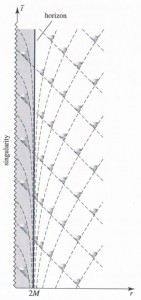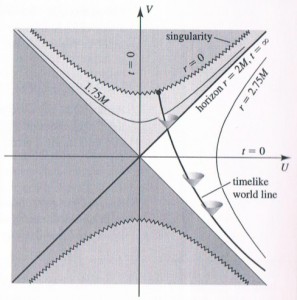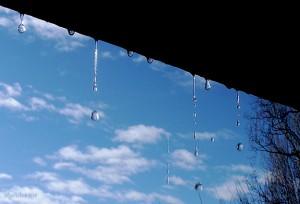Physicist: Before answering your question, I’ll waste your time with two quick asides.
First: The place where the “ripping” might occur would be at the singularity. “Singularity” is actually a very general term that roughly means “something goes to infinity in finite time or distance”. Singularities are surprisingly common in nature and math. For example, if you look at the flow of water around a drain, you’ll find that the math predicts that the water will spin faster the closer to the center it is. In fact, the water should spin infinitely fast exactly at the center. However, if you actually try this experiment you’ll find that there is no water at the exact center. Either you’ll have a whirlpool (so there’s air at the center), or the water will flash into steam (from a drop in pressure). The universe truly is a slippery eel. Every time the math predicts a singularity, the universe finds someway to cheat and get around it. The math of General Relativity predicts that the stretching of space will be infinite at the center of a black hole. But my inner cynic says that the universe probably does something duplicitous and clever, and we need to do an experiment to figure out what that is. Sadly, we’ll never do that experiment (can’t get out of a black hole), so the inside of black holes will be ready fodder for sci-fi authors for a long time yet.
Second: The source of the idea that black holes might go somewhere is what might be called “mathematically based paranoia”. Often in physics simple experiments will lead to simple math, that in turn makes very bizarre predictions. Relativistic time dilation, quantum tunneling, and anti-particles are all examples of this. Anti-particles were literally discovered because of a simple term, that had both a positive and negative solution. Experiences like these make physicists very careful about throwing out solutions to equations, just because they’re “unreasonable”. In the case of black holes the equations are the “Kruskal-Szekeres coordinates“, which are used to make the behavior of light and matter in, and around, black holes more intuitive.

Radial Direction vs. Time near a blackhole
The dotted lines are sample light paths going inward and outward. All matter must travel between these lines (matter can’t travel faster than light). Notice that the lines are really messed up near the event horizon.
-

U vs. V (the Kruskal-Szekeres coordinates)
In these coordinates the graph is cleaned up. Time points roughly “up” on this graph, light always travels the same way, and the lightcones are thus “unbent”. Everything outside of the blackhole is now in the rightmost triangle. But the space in the leftmost triangle seems to work the same as the space on the right. Could it exist? Physicists wouldn’t want to rule it out immediately. Since light travels at 45º on this graph, you would have to travel faster than light to find out for sure however. So this is where the idea that blackholes could lead to “somewhere else” comes from.
Finally, to actually answer the original question:
Maybe? It may happen that as matter gathers in one place the space around it “pinches off”. To the outside this would look like the formation of a blackhole. You can picture this like water drops forming, and then falling off of the bottom of a flat surface. Time in the new universe would be independent of time in our universe. Not just “flowing at different rates”, but completely apart. There would be no way to talk about “what’s happening right now in the other universe”.

Could our universe be a pinched off blackhole? Sure? There’s no good reason (that I’m aware of) to doubt conservation of matter and energy, so it would have had to be a really (really) big one.
It’s worth mentioning that whether or not blackholes go anywhere is fundamentally unimportant, since: 1) You can’t actually pass the event horizon (time from an outside perspective slows to zero on approach). 2) On approach you’ll be torn down to your atoms by the tidal forces. 3) You’d never get back out to tell the tale.
Both of the above graphs were happily stolen from “Gravity”, by James Hartle.
The water drop photo is from “Drop Shots!, Reflections on the Waterdrop“.







Sorry for the perhaps silly question, but if we cannot pass the event horizon, how Black Holes increase their mass? It seems that all attracted mass will take forever to enter the Black Hole…
Not silly at all, it bothers me too. From an outside perspective it does take forever for things to fall into a blackhole. However, the blackhole still gains the mass of the in-falling object. Whether the object passes through the event horizon, or ends up schmeared across it makes very little difference.
Pingback: Q: Can one truly create something from nothing? If matter formed from energy (as in the Big Bang expansion), where did the energy come from? « Ask a Mathematician / Ask a Physicist
well i just googled for a good picture of Kruskal–Szekeres coordinates and got here this way..
after looking for some time at you diagram i think the worldline is a bad example since it shows an observer with initial velocity close to lightspeed (in your actual drawing he is actually faster then the speed of light at the lower right end of his path) and is constantly excellerating outward (thus braking) in the first phase of his movement
after about the first lightcone it gets harder to see his velocity but it stays roughly the same instead of the gravitational acceleration expected for a free falling observer
In K-S coordinates it’s a little difficult to get a good idea of what’s going on. A beam of light always travels on 45° lines (nice) and the removable singularity of the event horizon is removed (very nice), but massive (sub-light speed) particles are tricky. For example, a particle hovering at the same altitude will follow a hyperbolic path. So when you’re far from the center of the diagram even stationary particles move along nearly 45° trajectories.
It’s very difficult to see true velocity, and especially acceleration, from K-S coordinates.
Also, it does look like it’s a little past 45° in the lower right. I blame the artist involved.
Can a black hole be used to travel through space and time. Has anyone ever been “sucked” into a black hole?
It’s very unlikely that black holes can be used like doorways. However, they might be useful for “gravitational slingshots“. The nearest (known) black hole is thousands of lightyears away, and the most distant that any human has every been is about 1 lightsecond (the Moon).
I just landed here trying to answer for myself a question on the extant of past light cones at the horizon. The way the Schwarzschild time coord diverges near the horizon seems to suggest that the past line cone of an infalling mass at the point of crossing may or will, as seen from infinity, be disproportionately expanded in comparison to the past light cone of events just slightly earlier in proper time on the world-line of that mass.
Is this correct?
pls is the schwarzschild radius related to the Planck length or are they vastly different?
@James
Unrelated. The Schwartzchild radius depends on the gravitational constant, the speed of light, and the mass of the object in question.
Maybe a silly question, but I though black holes were not actually ‘holes’, they are large objects with so much mass that the gravitational force it exerts on objects is so strong nothing can escape. If my understanding is correct it is just a spherical ball of mass that cannot be seen due to its gravity? If so, how could it possibly be a portal to another universe?
also, I don’t fully understand how it could ‘rip’ the fabric of space, it is not flat, we live in a 3 dimensional universe, so which ‘direction’ would the black hole rip?
If someone was to somehow (talking theoretical physics here) get into the event horizon, what could they expect to see/happen if anything? I’m extremely curious about it.
A black hole may lead to a parallel universe. In fact, it might lead to an anti-universe where everything happens in an opposite manner from how it does in ours. I wouldn’t be surprised at this, since not only is the universe (multiverse?) stranger than our thoughts, it is stranger than what we could ever think up in our puny brains.
That’s a pretty good question, well, first of all the black hole’s singularity (the center) has infinite density so immeasurable mass at the center, that is why they are called rips and lead down to a singularity, where everything is non-existent but a rip in the space time fabric could be achieved by tachyons (energized particles of speed and electricity combined) and really frickin’ high speed. We cannot go in a black hole as its center is sucking in mass so powerfully that it would squeeze us like a lemon the moment we enter it and become noodles.
IMAGINE STANDING ON A BRIDGE OVERLOOKING A EIGHT LANE
(ONE-WAY )HIGHWAY.
THE CARS ARE ZOOMING AT HIGH SPEEDS.
WHEN YOU LOOK AT THE VERY FAR END OF THE HIGHWAY, IT WILL LOOK LIKE THE CARS ARE ALL MERGING INTO ONE ANOTHER AND THE EIGHT LANE HIGHWAY IS MERGING TO A POINT.
ON A LARGER COSMIC SCALE, WE ARE CALLING THE POINT A BLACK HOLE.
WHAT IS WRONG WITH THIS LINE OF THINKING?
@RAO KANCHERLA
What you’re describing is an optical effect. We can take those effects into account so that, using your highway example, we can accurately find the actual size of the highway, the cars, and their speeds despite the fact that they appear to be smaller and slower the farther away they are.
Welp silly as it sounds whats would happen if we were to rip open a black hole?
It’s a hole in the Infinite fence . One cannot get beyond an infinite fence so one must go through it .
I just wanted to ask something about a theory that me and my friend came up with. We’re just 8th graders, so it might be stupid, but if it’s no trouble, could you tell me the answer about this? We found out that THEORETICALLY, white holes might be real. But we came up with the theory that at the end of a black hole’s lifespan, it turns into a white hole, spewing out stuff. It can only suck things into it for so long, right? So, supposedly, there’s a black hole in the center of our universe. We came up with the theory that this black hole will expand as it gains mass. Supposedly, once it sucks in absolutely everything, eventually it will die and turn into a white hole, but with so much matter it will explode and spew out absolutely everything (like a supernova), causing another Big Bang and thus recreating the entire universe, and possibly starting life all over again, recycling everything. Do you think this could be a genuine theory? Thank you, Mr. Physicist.
@Anonymous
You may be thinking of Sagittarius A*, the super-massive black hole at the center of our galaxy. There’s no particular place that’s the “center to the universe”.
As far as we know, black holes never turn into white holes; no “tipping point” where they do anything different. There’s good theoretical evidence that they “evaporate” over huge time scales (this post talks a little about what that would look like), but that’s not what you’re talking about.
White holes are an unreasonable mathematical artifact that comes about when: 1) you consider a black hole that doesn’t change and has existed literally forever (neither of which are things that happen in reality), 2) then describe the situation is some fairly complicated coordinates, and finally 3) get too excited about your own math.
I had my own epiphany of this – particularly the idea of a rip in space time splashing like water into a new existence or multiverse. Imagine my joy when seeing this and I looked at the date of the article and was like – wow someone thought of this about 9 years ago – I thought it was pretty novel. The funny thing is wondering – when the rip actually happens like a raindrop – what happens to the original black hole when the matter is pinched off — does space time ever space time ever snap back or does it keep dripping like a leaky faucet?
I’m no scientist, but I believe that there’s numerous possibilities when it comes to space, time, dimensions & possible universes. Then again maybe that’s just love of movies. Although no one has proven correct or incorrect on any of these. Personally, I’m leaning on the optimistic possibility that any of it could be true & we (& whoever’s on the otherside) would both benefit from each other.